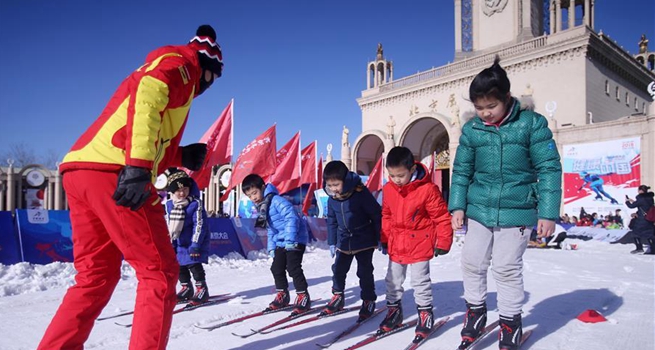ANKARA, Dec. 23 (Xinhua) -- Turkey is faced with the tough decision of choosing between two competing missile systems for its defense requirements, but some experts believe that the NATO country could be compelled to select the U.S. Patriot against the Russian S-400.
Amid a reconciliation process between Washington and Ankara, two NATO partners since 1952, the U.S. State Department announced on Dec. 18 that it approved the possible sale of 3.5-billion-U.S.-dollar Patriot surface-to-air missile systems to Turkey.
The approval is an attempt by the U.S. President Donald Trump's administration to get Turkey to give up its plan to purchase the Russian-made advanced S-400 missile system.
Trump and his Turkish counterpart Recep Tayyip Erdogan had a telephone conversation prior to the U.S. decision on troops withdrawal from Syria.
The two leaders reportedly also discussed the sale of Patriot in the conversation.
Ankara has reportedly paid a hefty deposit of the S-400 missile to Moscow, which has been a major hurdle to the U.S.-Turkish ties amid fears that the Russian system could allow the Russian military to collect intelligence on U.S. and NATO systems.
Turkey's plan to buy the 2.5-billion-U.S.-dollar S-400 missile system is in line with a rapprochement between Ankara and Moscow on several fields such as trade and nuclear cooperation.
However, the rapprochement jeopardized Ankara's acquisition of the F-35 fighters, as members of Congress have attempted to block the delivery of the jets over concerns about the Russian missile system.
"Turkey should ask itself if it has the need and money to purchase both systems. The answer is 'No'," Ozgur Eksi, editor-in-chief of the magazine C4 Defence told Xinhua.
"The decision which Turkey has to take will be a political one," said Eksi.
The expert believed that in the end, Ankara would lean towards acquiring the U.S. system in order to refrain from antagonizing its NATO partner and sparking fresh bilateral tensions.
A Turkish official source told Xinhua anonymously that there was no change in plans to buy the S-400 modern weapons system, saying that Ankara is planning to acquire both Russian and U.S.-made missile systems.
The Kremlin for its part said that the sale would be unaffected by Washington's offer.
However, it's not clear if Washington would agree to such a scheme.
According to observers, President Trump's unexpected move to withdraw U.S. troops from Syria is designed to convince the Turks who will have the carte blanche to uproot the U.S.-backed Kurdish militia in the war-torn country.
Washington also wants to make Turkey more firm in the realm of NATO as tensions are rising with Iran, Turkey's eastern neighbor.
"Turkey is confronted with a complicated issue and has to take eventually a rather difficult decision. It's either one or the other," Sinan Ulgen, a former diplomat who chairs the Istanbul-based Center for Economics and Foreign Policy Studies, told Xinhua.
There is also a possibility that even if Turkey and the U.S. agree on a Patriot deal, the U.S. Congress would deny it unless Turkey gives up the Russian S-400 missile deal or the two sides agree on a different solution.
According to Eksi, if Turkey scraps its deal with the Russians, the deposit for the purchase will be lost, said Eksi.
By the end of the year, the U.S. Congress has to approve or reject the proposed sale of the Patriot missiles.
Turkey's plan to buy Russian missiles and the U.S. continuing support of Kurdish People's Protection Units (YPG), which Ankara condemns as terrorists, have badly strained U.S.-Turkish relations.
Days before the announcement of the Patriot missile deal and the U.S. pullout from Syria, Erdogan vowed to carry out a new Turkish offensive against the YPG in northeastern Syria.
However, on Saturday, the Turkish leader said that his country has decided to postpone its cross-border operation into Syria following his phone conversation with Trump.
Turkey finalized plans to buy the Russian systems in 2017, with first delivery scheduled for October 2019. Russia promised Turkey joint production and technology transfer as part of the agreement.
Turkey is striving to enhance its air defense for decades, particularly after Washington decided in 2015 to withdraw its Patriot system from Turkey's border with Syria, a move that weakened Turkey's air defense.

















